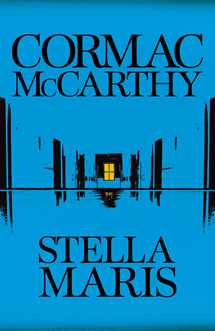Reviewed by Robert Goodman.
By Cormac McCarthy, Pan Macmillan, $34.99.
 Stella Maris is described by the publisher as a “coda” to Cormac McCarthy’s latest novel The Passenger. Coda is a musical term that refers to “the concluding passage of a piece or movement, typically forming an addition to the basic structure”. And in this respect at least, Stella Maris delivers. While it can (and does) exist as a standalone novel, it works much better as a text that expands on and illuminates the ideas and issues that McCarthy attempts to tackle in The Passenger.
Stella Maris is described by the publisher as a “coda” to Cormac McCarthy’s latest novel The Passenger. Coda is a musical term that refers to “the concluding passage of a piece or movement, typically forming an addition to the basic structure”. And in this respect at least, Stella Maris delivers. While it can (and does) exist as a standalone novel, it works much better as a text that expands on and illuminates the ideas and issues that McCarthy attempts to tackle in The Passenger.
Stella Maris is pure dialogue. It is a series of conversations between a psychiatrist and a woman called Alicia who has committed herself to the titular asylum in the early 1970s. Alicia is the daughter of one of the men who worked on the Manhattan project, she is a mathematics genius who went on to higher education in her teens. She is also the sister of Bobby Western, the protagonist of The Passenger.
Alicia was introduced to an extent in The Passenger, seen not only through her brother Bobby’s memories and conversations but in the brief interludes which document her interactions with an odd menagerie of (possibly) imagined characters. Stella Maris takes readers back to the time before her death, which opened the companion novel. Alicia is erudite, sarcastic, insightful but also haunted by visitations of carnival-like characters and tortured by her father’s work and her connection to her brother Bobby, who she left behind after a serious a car accident left him in a coma.
Stella Maris is in some respects more successful than The Passenger. It ranges in similar territory (pure mathematics, nuclear physics, philosophy, music, the Manhattan project, mental illness), but it does so in a much more focussed and coherent way, not relying on what seem to be random conversations with random characters to bring these issues to light. But it also suffers from the same issues that The Passenger did in that characterisation is put second to the depth of exploration of these ideas and ultimately their tangential connection to anything resembling a plot. In the end, as a coda, it will probably only be appreciated by readers who have already enjoyed The Passenger and are looking for more insight into the issues that McCarthy seems fascinated with. For others it will either be unengaging or just more of the same.
Over 850 more reviews can be found on Pile by the Bed.











